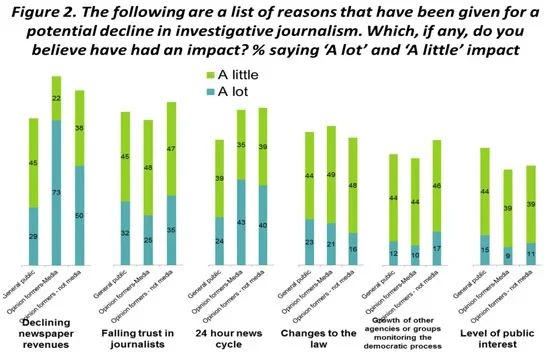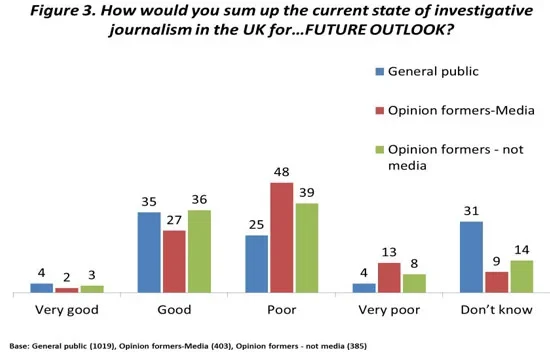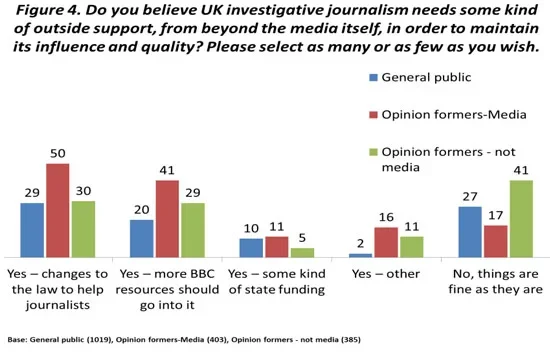Investigative journalism in the UK has scored some significant hits in recent years and also seen some major lows. It is therefore perhaps concerning for those who believe a free media is central to UK democracy that only a slim majority of the public (53%) agree that investigative journalism in the UK is having a positive impact on the UK’s democracy, while in contrast 88% of journalists and other media opinion formers agree. (Figure 1) The public also doesn’t recognise issues in funding with many showing they don’t know what state the funding of investigative journalism is currently in.
It may also be worrying that only half (49%) of the public agree ‘the public still has a real interest in investigative journalism’, though 71% of media opinion formers hold this view. Meanwhile the public does agree that declining investment, declining journalist quality, the 24-hour news cycle, and short-term editorial focus are having a negative impact.
For the study YouGov completed online interviews with 1019 members of the UK general public, and 788 opinion formers from its UK Opinion Formers Panel and from members and contacts of the London Press Club. Opinion Formers are leaders in their field from business, media, politics, NGOs, academia and beyond. Fieldwork was undertaken between 20th September and 7th October 2013.
.jpg)
QUALITY
Investigative journalism in the UK is generally perceived as being of good or very good quality. Nearly three quarters (74%) of opinion formers from the media, 62% of other opinion formers, but a much lower 49% of the general public state this. 65% of opinion formers from the media also believe that ‘Journalists are of high quality’ but only 35% of the public agree. However, many respondents believe there is still room for improvement: 39% of the public state that journalists aren’t of high enough quality, as do 29% of those media opinion formers.

FUNDING PROBLEMS
Nevertheless, it is understood that investigative journalism in the UK has been hit by a series of problems, above all that of funding. 75% of opinion formers working in the media say it suffers from poor funding, of which 28% believe it is very poor. However the public don’t see this, with just 31% of the general public believe funding is poor; a large proportion (44%) is not sure, with 26% even stating that funding for investigative journalism is good or very good.
Asked about a selection of problems that may be impacting investigative journalism, a large majority cites Declining newspaper revenues. (Figure 2) This is the top problem for opinion formers in the media, with 73% saying it has ‘a lot’ of an impact, and a further 22% ‘a little’ impact. 74% of the public also believe declining revenues is having a negative impact.
OTHER PROBLEMS
Falling trust in journalists is also seen by many as a problem, with 32% of the public saying this is affecting investigative journalism ‘a lot’, and a further 45% saying a ‘little.’ Similar proportions of the opinion formers also hold this view. The 24 hour news cycle is another problem identified by 43% of media opinion formers as having a lot of an impact, with a further 35% saying a little. And 75% of opinion formers believe that ‘Editors are too short-termist’, a view shared by 49% of the general public.
LEGAL FRAMEWORK
A further problem seen as hampering investigative journalism is the legal framework: 60% of opinion formers in the media agree that there are ‘Too many legal restrictions and risks for journalists these days.’ 42% of the public also agree. On the specific issue of super-injunctions, three in five media opinion formers consider the protection they provide to be a reasonably or very bad thing. The public is more divided, with little agreement.
FUTURE OUTLOOK
There is a division between media opinion formers and the general public over the future outlook of investigative journalism in the UK. The former are pessimistic, with 61% of opinion formers in the media seeing the future of investigative journalism as poor or very poor. However, only 29% of the public believe it to be poor; while 39% have a positive outlook, with a further 31% unsure. (Figure 3)

A similar pattern emerges as to whether investigative journalism in the UK is a ‘dying art’. Again, media opinion formers are pessimistic, with 54% holding this view, and only 28% saying it is ‘flourishing’. The public is more divided: only 34% agree, 38% aren’t sure, and 28% state it is flourishing. And, although most of the general public also believe the impact of investigative journalism is either increasing (31%) or staying the same (41%), opinion formers in the media are more divided on this; although 22% believe the impact is increasing, and 34% state that it is staying the same, 39% believe it is decreasing.
SUPPORTS FOR INVESTIGATIVE JOURNALISM
As to whether the potential decline in investigative journalism in traditional media outlets can adequately be filled by citizen journalists through digital media, opinion formers from the media are generally opposed to this idea, with 35% disagreeing and 28% strongly disagreeing. The public is far less clear with only 20% disagreeing. 28% do believe that citizen journalists will be able to compensate, but the majority (52%) is undecided.

In this context, a majority of opinion formers from the media call for some kind of outside support to help investigative journalism maintain its influence and quality. 74% believe some form of support is necessary, with changes to the law (50%) and increased BBC funding (41%) popular options. Outside of the media, agreement with the idea of support is lower; only 48% of the general public and 50% of other opinion formers believe that external support is necessary. (Figure 4)






